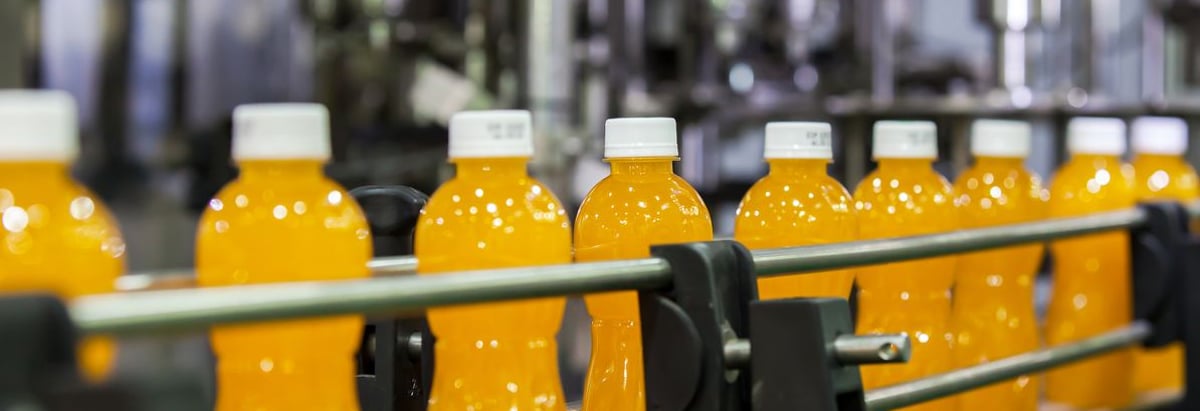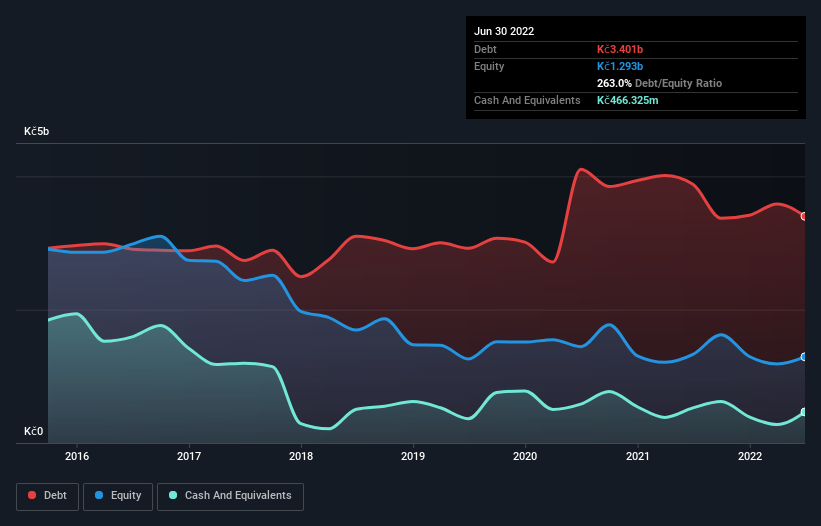- Czech Republic
- /
- Beverage
- /
- SEP:KOFOL
We Think Kofola CeskoSlovensko (SEP:KOFOL) Is Taking Some Risk With Its Debt

Some say volatility, rather than debt, is the best way to think about risk as an investor, but Warren Buffett famously said that 'Volatility is far from synonymous with risk.' So it seems the smart money knows that debt - which is usually involved in bankruptcies - is a very important factor, when you assess how risky a company is. As with many other companies Kofola CeskoSlovensko a.s. (SEP:KOFOL) makes use of debt. But the more important question is: how much risk is that debt creating?
Why Does Debt Bring Risk?
Debt assists a business until the business has trouble paying it off, either with new capital or with free cash flow. If things get really bad, the lenders can take control of the business. However, a more frequent (but still costly) occurrence is where a company must issue shares at bargain-basement prices, permanently diluting shareholders, just to shore up its balance sheet. By replacing dilution, though, debt can be an extremely good tool for businesses that need capital to invest in growth at high rates of return. The first step when considering a company's debt levels is to consider its cash and debt together.
View our latest analysis for Kofola CeskoSlovensko
How Much Debt Does Kofola CeskoSlovensko Carry?
As you can see below, Kofola CeskoSlovensko had Kč3.40b of debt at June 2022, down from Kč3.88b a year prior. However, because it has a cash reserve of Kč466.3m, its net debt is less, at about Kč2.93b.

A Look At Kofola CeskoSlovensko's Liabilities
Zooming in on the latest balance sheet data, we can see that Kofola CeskoSlovensko had liabilities of Kč2.80b due within 12 months and liabilities of Kč3.59b due beyond that. On the other hand, it had cash of Kč466.3m and Kč1.25b worth of receivables due within a year. So its liabilities total Kč4.67b more than the combination of its cash and short-term receivables.
This deficit is considerable relative to its market capitalization of Kč5.29b, so it does suggest shareholders should keep an eye on Kofola CeskoSlovensko's use of debt. Should its lenders demand that it shore up the balance sheet, shareholders would likely face severe dilution.
We use two main ratios to inform us about debt levels relative to earnings. The first is net debt divided by earnings before interest, tax, depreciation, and amortization (EBITDA), while the second is how many times its earnings before interest and tax (EBIT) covers its interest expense (or its interest cover, for short). The advantage of this approach is that we take into account both the absolute quantum of debt (with net debt to EBITDA) and the actual interest expenses associated with that debt (with its interest cover ratio).
Kofola CeskoSlovensko's debt is 3.2 times its EBITDA, and its EBIT cover its interest expense 2.8 times over. This suggests that while the debt levels are significant, we'd stop short of calling them problematic. The good news is that Kofola CeskoSlovensko improved its EBIT by 4.0% over the last twelve months, thus gradually reducing its debt levels relative to its earnings. There's no doubt that we learn most about debt from the balance sheet. But ultimately the future profitability of the business will decide if Kofola CeskoSlovensko can strengthen its balance sheet over time. So if you want to see what the professionals think, you might find this free report on analyst profit forecasts to be interesting.
Finally, a company can only pay off debt with cold hard cash, not accounting profits. So we always check how much of that EBIT is translated into free cash flow. Over the last three years, Kofola CeskoSlovensko actually produced more free cash flow than EBIT. That sort of strong cash generation warms our hearts like a puppy in a bumblebee suit.
Our View
Neither Kofola CeskoSlovensko's ability to cover its interest expense with its EBIT nor its level of total liabilities gave us confidence in its ability to take on more debt. But its conversion of EBIT to free cash flow tells a very different story, and suggests some resilience. We think that Kofola CeskoSlovensko's debt does make it a bit risky, after considering the aforementioned data points together. Not all risk is bad, as it can boost share price returns if it pays off, but this debt risk is worth keeping in mind. There's no doubt that we learn most about debt from the balance sheet. But ultimately, every company can contain risks that exist outside of the balance sheet. These risks can be hard to spot. Every company has them, and we've spotted 2 warning signs for Kofola CeskoSlovensko (of which 1 can't be ignored!) you should know about.
If, after all that, you're more interested in a fast growing company with a rock-solid balance sheet, then check out our list of net cash growth stocks without delay.
If you're looking to trade Kofola CeskoSlovensko, open an account with the lowest-cost platform trusted by professionals, Interactive Brokers.
With clients in over 200 countries and territories, and access to 160 markets, IBKR lets you trade stocks, options, futures, forex, bonds and funds from a single integrated account.
Enjoy no hidden fees, no account minimums, and FX conversion rates as low as 0.03%, far better than what most brokers offer.
Sponsored ContentValuation is complex, but we're here to simplify it.
Discover if Kofola CeskoSlovensko might be undervalued or overvalued with our detailed analysis, featuring fair value estimates, potential risks, dividends, insider trades, and its financial condition.
Access Free AnalysisHave feedback on this article? Concerned about the content? Get in touch with us directly. Alternatively, email editorial-team (at) simplywallst.com.
This article by Simply Wall St is general in nature. We provide commentary based on historical data and analyst forecasts only using an unbiased methodology and our articles are not intended to be financial advice. It does not constitute a recommendation to buy or sell any stock, and does not take account of your objectives, or your financial situation. We aim to bring you long-term focused analysis driven by fundamental data. Note that our analysis may not factor in the latest price-sensitive company announcements or qualitative material. Simply Wall St has no position in any stocks mentioned.
About SEP:KOFOL
Kofola CeskoSlovensko
Produces and distributes non-alcoholic beverages in the Czech Republic, Slovakia, Slovenia, Croatia, Poland, and internationally.
Proven track record and fair value.
Market Insights
Community Narratives



